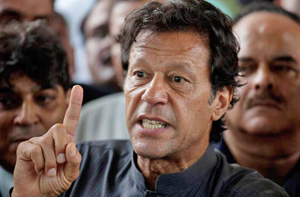Islamabad, Aug 17: Pakistan opposition leader Imran Khan today warned the PML-N government that thousands of his supporters could enter the high-security Red Zone here if Prime Minister Nawaz Sharif refuses to quit, as popular cleric Tahir-ul Qadri issued a 48-hour ultimatum demanding the same.
Both Pakistan Tehreek-e-Insaf chairman Khan and Pakistan Awami Tehreek chief Qadri started separate rallies from Lahore on Thursday and reached in the national capital after more than 35 hours. They are camping at different venues.
Khan warned that unless their demands are not met within a certain time period, his 'tsunami' would cross into the Red Zone and protest in front of Parliament.
"Don't blame me if I failed to control these people (from entering high security area). I can control them until tomorrow (Sunday) night," he said past midnight today.
On the other hand, Qadri presented a list of 14 demands in which he demanded that the Sharif government resign and the (provincial) assemblies are dissolved "within 48 hours".
Khan is protesting against alleged rigging of last year polls while Qadri had announced to bring a revolution in the country. Their demands invited strong criticism from PML-N government, with Information minister Pervaiz Rashid saying "They (Khan and Qadri) are giving deadline to democracy in the country and not the government."
He said both Khan and Qadri were allowed to go ahead with protests march after clear understanding to the government that they will respect the Red Zone where key offices and diplomatic missions are located.
Altaf Hussan, London-based chief of Mutahida Qaumi Movement, urged both leaders to give up their extreme demand and withdraw deadlines. He also asked the government to start talks for finding a solution within the constitution of the country.
There are also reports that government was planning to shift the venue of Khan's protest which is a few hundreds meter away from the Red Zone.
Khan had joined his protesters on Kashmir Highway last evening and remained with them till this morning. He also briefly slept in a makeshift bed with the workers. He tried to charge them with short speeches during the night.
His rally later turned into a musical night as famous singers performed live, swaying the crowd as well as the leaders. While colleagues of Khan were shown dancing, he kept trademark cool but was visibly enjoying the music.
Separately, Qadri turned up at his rally venue at the midnight to inject new force into thousands of exhausted men and women. The government has so far followed the policy of "let the marchers and their leaders exhaust themselves".
Sharif does not have immediate fears from them as both Khan and Qadri failed to pull expected number of people. There were continually lashed by the monsoon rains for last two day.
But today the sun is shining with full force, creating further problems as they are sitting under open sky. Sharif is relived as there is no obstruction in the government functioning as the entire country has turned normal after removal of roadblocks initially placed to stop the protesters.
The backdoor consultation are continuing and certain political actors like Jammat-i-Islami chief Sirajul Haq are working feverously to find a middle way.
In many TV interviews, Haq urged the government to show openness in dealing with the protesters. Dunya television reported that Sharif has called a meeting of political parties today to discuss ways to deal with the demands of both Khan and Qadri.
It is believed that resignation option is already off the table but the political leaders will offer concessions like reforming the electoral and political system to make it more representative.





Comments
Add new comment